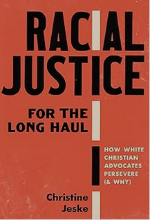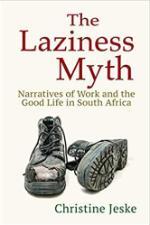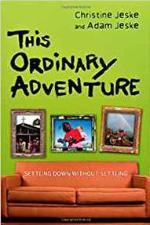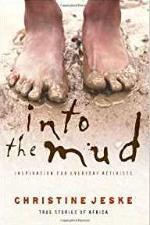Biography
Christine Jeske joins with others to consider how to live good and just lives in this multicultural world. After a decade working in microfinance, refugee resettlement, community development, and education while living in Nicaragua, China, and South Africa, she completed a PhD in Cultural Anthropology from the University of Wisconsin. She also holds an MBA in International Economics from Eastern University. She lives in an old farm named the Sanctuary, home to an ever-shifting combination of chickens, sheep, pigs, raspberries, weeds, guests, two grown children, and one wonderful husband. In her previous book, The Laziness Myth, she explores what goes wrong with work and what people do about it. In Racial Justice for the Long Haul: How White Christian Advocates Persevere (available for pre-order), she offers practical research on how people pursue a more just world.
Education
University of Wisconsin-Madison
Ph.D., Cultural Anthropology, 2016
University of Wisconsin-Madison
M.A., Cultural Anthropology, 2013
University of Wisconsin-Madison
B.A., English & Piano 1999
Eastern University, PA
M.B.A., Economic Development, 2004
Areas of Expertise
- Work and vocation
- Race and social inequities
- Economic development
- Africa
- Theories of the good life
- Medical anthropology
- United States farming systems
Links
Presentations
Overturning for the Common Good: Membership and Mutuality in a World of Markets and Meritocracy
Baylor University Symposium on Faith and Culture, Oct. 2023
How to hope without commensurability: White Christians entering the long-term struggle for racial justice
Society for Economic Anthropology, May 2023
Where is Privilege in the Vocation Conversation?
Network for Vocation in Undergraduate Education, Feb. 2020
Pay Doesn't Matter: Work-Readiness Training Messages in South Africa
University of Wisconsin-Madison Colloquium Series, Jan. 2017
Hustling: Moral Economies of a Good Life Among South African Young Men
American Anthropological Association, Nov. 2016
South African narratives of a good life: insights into work, church, and prejudice "On Knowing Humanity"
Conference Eastern University, 2015
Conflicting messages in church and culture on how work makes a good life
Theology Roundtable Seminar University of KwaZulu-Natal, 2015
Is Laziness the Problem?: Unemployment and the Good Life Among Zulu South Africans
University of KwaZulu-Natal South Africa, 2014
Courses Taught
- African Anthropology
- Anthropological Writing
- Culture and Difference
- Culture, Economy, and Morality
- Culture Theory
- Food, Farms, and Culture
- Medical Anthropology
- Meanings of Work and Labor
- What is Money Good For?
Select Publications
Unlearning Hope: White Christian Encounters with Grace as a Logic of Exchange
Economic Anthropology
How do humans develop hope in the face of seemingly irreparable harm against each other? What does grace have to do with hope for an end to racism?
view this EA article
Re-Enchanting Meat: How Sacred Meaning-Making Strengthens the Ethical Meat Movement
Agriculture and Human Values
For many butchers and farmers involved in the ethical meat movement, finding a better way to raise meat involves fostering discourses about sacredness, mutuality, and wonder.
view this Agric Hum Values article
This Pandemic Hits Americans Where We're Spiritually Weak
Christianity Today
COVID-19 slammed North Americans up against some of our deepest lies and idols. Identifying how our culture has left us poorly prepared for this can move us toward the kind of sorrow that produces repentance and justice.
view this CT article
Are We Underthinking Underemployment?: Toward a More Inclusive Theology of Vocation
Christian Scholars Review
We often assume that everyone just chooses a career path that fulfils their deepest dreams. But what about when work doesn’t turn out that way?
view this CSR article
Why Work? Do We Understand What Motivates Work-Related Decisions in South Africa?
Journal of Southern African Studies
Why do people work? In South Africa, where over 50 per cent of working age adults do not have jobs, this question drives to the heart of efforts to encourage employers to create jobs and workers to persist in costly job searches. This article offers new ways of thinking about employment by identifying non-monetary motivating factors that are too often ignored.
view this JoSAS article
Are Cars the New Cows? Changing Wealth Goods and Moral Economies in South Africa
American Anthropologist
2016 In much of sub-Saharan Africa, cattle have played a central role in maintaining social cohesion by binding people of various means into mutual obligations. Today, among South African Zulu communities, as in much of the world, the social obligations attached to wealth are fiercely contested. To trace conflicts in emerging moral economies, I compare in this article the social roles of cows versus those of another wealth good: cars...
view this article on the AA site
Books by Christine Jeske
 Racial Justice for the Long Haul: How White Christian Advocates Persevere (& Why)
Racial Justice for the Long Haul: How White Christian Advocates Persevere (& Why)
IVP Academic
Coming 2026
Pre-order Racial Justice for the Long Haul on Amazon.com
 The Laziness Myth: Narratives of Work and the Good Life in South Africa
The Laziness Myth: Narratives of Work and the Good Life in South Africa
ILR Press
2020
Order The Laziness Myth on Amazon.com
 The Ordinary Adventure: Setting Down Without Settling
The Ordinary Adventure: Setting Down Without Settling
IVP Books
2012
Order The Ordinary Adventure on Amazon.com
 Into the Mud: Inspiration for Everyday Activists
Into the Mud: Inspiration for Everyday Activists
Moody Publishers
2010
Order Into the Mud on Amazon.com
/prod02/channel_1/media/faculty/Christine-Jeske-2025-reduced.jpg)